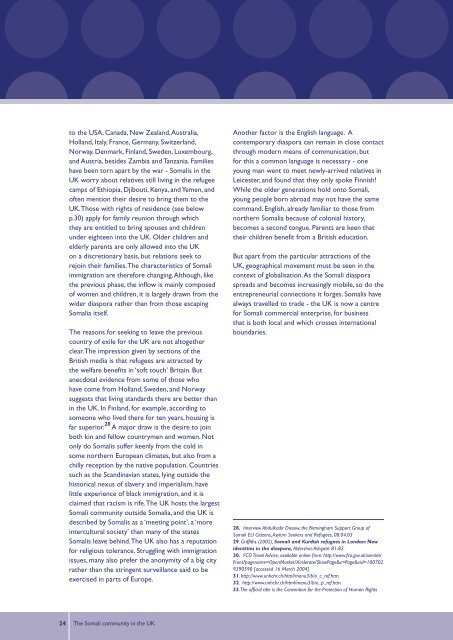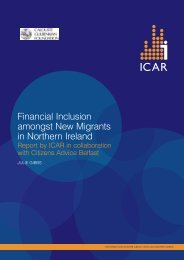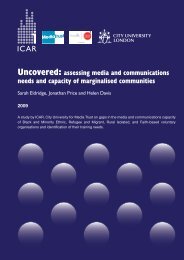The Somali community in the UK: What we know and how we ... - ICAR
The Somali community in the UK: What we know and how we ... - ICAR
The Somali community in the UK: What we know and how we ... - ICAR
You also want an ePaper? Increase the reach of your titles
YUMPU automatically turns print PDFs into web optimized ePapers that Google loves.
to <strong>the</strong> USA, Canada, New Zeal<strong>and</strong>, Australia,<br />
Holl<strong>and</strong>, Italy, France, Germany, Switzerl<strong>and</strong>,<br />
Norway, Denmark, F<strong>in</strong>l<strong>and</strong>, S<strong>we</strong>den, Luxembourg,<br />
<strong>and</strong> Austria, besides Zambia <strong>and</strong> Tanzania. Families<br />
have been torn apart by <strong>the</strong> war - <strong>Somali</strong>s <strong>in</strong> <strong>the</strong><br />
<strong>UK</strong> worry about relatives still liv<strong>in</strong>g <strong>in</strong> <strong>the</strong> refugee<br />
camps of Ethiopia, Djibouti, Kenya, <strong>and</strong> Yemen, <strong>and</strong><br />
often mention <strong>the</strong>ir desire to br<strong>in</strong>g <strong>the</strong>m to <strong>the</strong><br />
<strong>UK</strong>. Those with rights of residence (see below<br />
p.30) apply for family reunion through which<br />
<strong>the</strong>y are entitled to br<strong>in</strong>g spouses <strong>and</strong> children<br />
under eighteen <strong>in</strong>to <strong>the</strong> <strong>UK</strong>. Older children <strong>and</strong><br />
elderly parents are only allo<strong>we</strong>d <strong>in</strong>to <strong>the</strong> <strong>UK</strong><br />
on a discretionary basis, but relations seek to<br />
rejo<strong>in</strong> <strong>the</strong>ir families. <strong>The</strong> characteristics of <strong>Somali</strong><br />
immigration are <strong>the</strong>refore chang<strong>in</strong>g. Although, like<br />
<strong>the</strong> previous phase, <strong>the</strong> <strong>in</strong>flow is ma<strong>in</strong>ly composed<br />
of women <strong>and</strong> children, it is largely drawn from <strong>the</strong><br />
wider diaspora ra<strong>the</strong>r than from those escap<strong>in</strong>g<br />
<strong>Somali</strong>a itself.<br />
<strong>The</strong> reasons for seek<strong>in</strong>g to leave <strong>the</strong> previous<br />
country of exile for <strong>the</strong> <strong>UK</strong> are not altoge<strong>the</strong>r<br />
clear. <strong>The</strong> impression given by sections of <strong>the</strong><br />
British media is that refugees are attracted by<br />
<strong>the</strong> <strong>we</strong>lfare benefits <strong>in</strong> ‘soft touch’ Brita<strong>in</strong>. But<br />
anecdotal evidence from some of those who<br />
have come from Holl<strong>and</strong>, S<strong>we</strong>den, <strong>and</strong> Norway<br />
suggests that liv<strong>in</strong>g st<strong>and</strong>ards <strong>the</strong>re are better than<br />
<strong>in</strong> <strong>the</strong> <strong>UK</strong>. In F<strong>in</strong>l<strong>and</strong>, for example, accord<strong>in</strong>g to<br />
someone who lived <strong>the</strong>re for ten years, hous<strong>in</strong>g is<br />
far superior. 28 A major draw is <strong>the</strong> desire to jo<strong>in</strong><br />
both k<strong>in</strong> <strong>and</strong> fellow countrymen <strong>and</strong> women. Not<br />
only do <strong>Somali</strong>s suffer keenly from <strong>the</strong> cold <strong>in</strong><br />
some nor<strong>the</strong>rn European climates, but also from a<br />
chilly reception by <strong>the</strong> native population. Countries<br />
such as <strong>the</strong> Sc<strong>and</strong><strong>in</strong>avian states, ly<strong>in</strong>g outside <strong>the</strong><br />
historical nexus of slavery <strong>and</strong> imperialism, have<br />
little experience of black immigration, <strong>and</strong> it is<br />
claimed that racism is rife. <strong>The</strong> <strong>UK</strong> hosts <strong>the</strong> largest<br />
<strong>Somali</strong> <strong>community</strong> outside <strong>Somali</strong>a, <strong>and</strong> <strong>the</strong> <strong>UK</strong> is<br />
described by <strong>Somali</strong>s as a ‘meet<strong>in</strong>g po<strong>in</strong>t’, a ‘more<br />
<strong>in</strong>tercultural society’ than many of <strong>the</strong> states<br />
<strong>Somali</strong>s leave beh<strong>in</strong>d. <strong>The</strong> <strong>UK</strong> also has a reputation<br />
for religious tolerance. Struggl<strong>in</strong>g with immigration<br />
issues, many also prefer <strong>the</strong> anonymity of a big city<br />
ra<strong>the</strong>r than <strong>the</strong> str<strong>in</strong>gent surveillance said to be<br />
exercised <strong>in</strong> parts of Europe.<br />
Ano<strong>the</strong>r factor is <strong>the</strong> English language. A<br />
contemporary diaspora can rema<strong>in</strong> <strong>in</strong> close contact<br />
through modern means of communication, but<br />
for this a common language is necessary - one<br />
young man <strong>we</strong>nt to meet newly-arrived relatives <strong>in</strong><br />
Leicester, <strong>and</strong> found that <strong>the</strong>y only spoke F<strong>in</strong>nish!<br />
While <strong>the</strong> older generations hold onto <strong>Somali</strong>,<br />
young people born abroad may not have <strong>the</strong> same<br />
comm<strong>and</strong>. English, already familiar to those from<br />
nor<strong>the</strong>rn <strong>Somali</strong>a because of colonial history,<br />
becomes a second tongue. Parents are keen that<br />
<strong>the</strong>ir children benefit from a British education.<br />
But apart from <strong>the</strong> particular attractions of <strong>the</strong><br />
<strong>UK</strong>, geographical movement must be seen <strong>in</strong> <strong>the</strong><br />
context of globalisation. As <strong>the</strong> <strong>Somali</strong> diaspora<br />
spreads <strong>and</strong> becomes <strong>in</strong>creas<strong>in</strong>gly mobile, so do <strong>the</strong><br />
entrepreneurial connections it forges. <strong>Somali</strong>s have<br />
always travelled to trade - <strong>the</strong> <strong>UK</strong> is now a centre<br />
for <strong>Somali</strong> commercial enterprise, for bus<strong>in</strong>ess<br />
that is both local <strong>and</strong> which crosses <strong>in</strong>ternational<br />
boundaries.<br />
28. Interview Abdulkadir Diesow, <strong>the</strong> Birm<strong>in</strong>gham Support Group of<br />
<strong>Somali</strong> EU Citizens, Asylum Seekers <strong>and</strong> Refugees, 08.04.03<br />
29. Griffiths (2002), <strong>Somali</strong> <strong>and</strong> Kurdish refugees <strong>in</strong> London: New<br />
identities <strong>in</strong> <strong>the</strong> diaspora, Aldershot: Ashgate: 81-82.<br />
30. FCO Travel Advice, available onl<strong>in</strong>e from: http://www.fco.gov.uk/servlet/<br />
Front?pagename=OpenMarket/Xcelerate/S<strong>how</strong>Page&c=Page&cid=100702<br />
9390590 [accessed 16 March 2004].<br />
31. http://www.unhchr.ch/html/menu3/b/o_c_ref.htm.<br />
32. http://www.unhchr.ch/html/menu3/b/o_p_ref.htm.<br />
33.<strong>The</strong> official title is <strong>the</strong> Convention for <strong>the</strong> Protection of Human Rights<br />
24 <strong>The</strong> <strong>Somali</strong> <strong>community</strong> <strong>in</strong> <strong>the</strong> <strong>UK</strong>

















